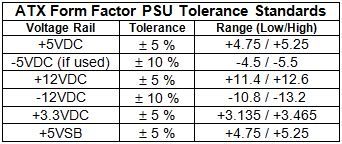But back to the original thought. Is it possible for a failing PSU to cause RAM to defect?
Thanks for your time!

Need help with your computer or device? Want to learn new tech skills? You're in the right place!
Geeks to Go is a friendly community of tech experts who can solve any problem you have. Just create a free account and post your question. Our volunteers will reply quickly and guide you through the steps. Don't let tech troubles stop you. Join Geeks to Go now and get the support you need!




Edited by Mr.E, 04 May 2010 - 01:45 PM.

I think there some confusion here. The PSU plugs into the motherboard and so does the RAM. And power for the RAM is routed from the PSU to the RAM. Just because the voltage is carried through a trace on the motherboard instead of power cord plugged into the RAM, the PSU still powers it.so in effect it wouldnt affect the memory directly but eventually power would get to the memory,
Well that's the problem, there is no way for normal users to conclusively test PSUs. Here's my canned text on testing PSUs:i may have a failing PSU but all tests went inconclusive so now i am thinking about just switching it out.



Of course not. You never connect a PSU directly to RAM. Think of a light bulb being plugged into an extension cord. The bulb is not directly connected to the wall, but the wall sure is providing the power.the PSU would directly affect the MoBo and other devices, it isnt plugged into the RAM
All motherboards have regulator circuits, but it is not as a precautionary measure - it is because ALL high-speed digital electronics need stable power. Also note that RAM typically runs on 1.5 to 1.8V - depending on the RAM. A PSU only provides 3.3V, 5V, and 12V. So within the power regulator circuits of ALL motherboards there are also voltage dividers to provide the other voltages not otherwise provided by the PSU. This has nothing to do with the motherboard's quality or feature set. It is simply a requirement for all motherboards.I couldnt remember whether or not the MoBo was supposed to have something to help better regulate amount of power sent to the RAM as a precautionary measure.
Nope. Again, this is a requirement of all motherboards. If the board accommodates overclocking, that simply means the maker provided a means for the user to make minor adjustments to the voltage beyond design specs.though now that i am thinking about it that sounds more like something you might see on a big OC'ing board.









0 members, 0 guests, 0 anonymous users







Community Forum Software by IP.Board
Licensed to: Geeks to Go, Inc.